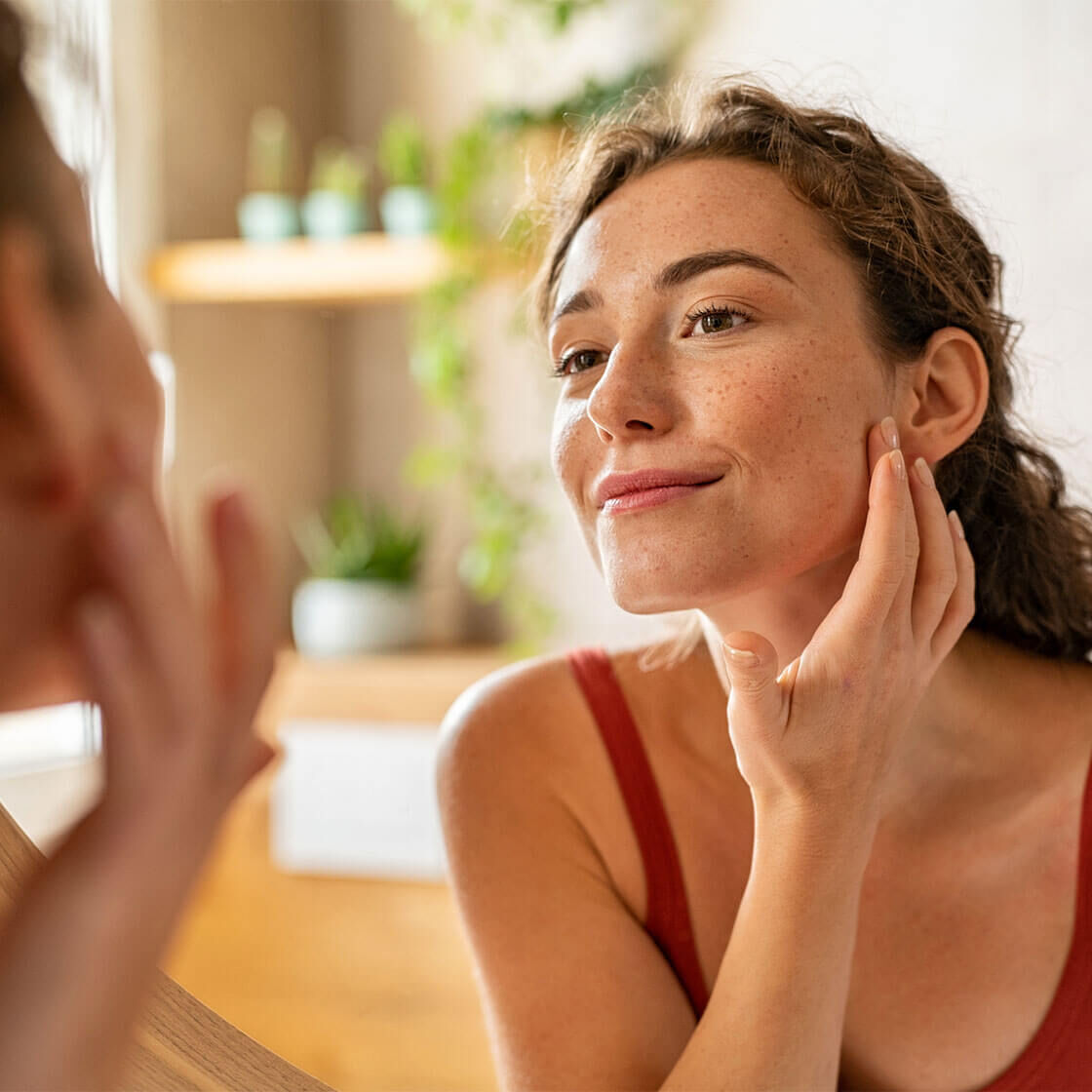Can Sunscreen Prevent Tanning? Debunking the Myths
Sunscreen is one of the most essential skincare products, but the common confusion is: can sunscreen prevent tanning? The answer is yes and no. While many believe that sunscreens work as complete shields from the sun, the truth is a little more complicated.
Although sunscreen significantly reduces sun damage, it does not guarantee a tan-free result. In this article, we will bust myths about sunscreen, explain how it works, its role in tanning, and the steps you can take to minimize sun damage.

How Does Sunscreen Work?
To answer, can sunscreen prevent tanning? We must understand how sunscreen works. Sunscreen protects the skin by forming a barrier against harmful ultraviolet (UV) rays. These UV rays, mainly UVA and UVB, penetrate the skin and cause sunburn, premature aging, and, in severe cases, even skin cancer.
Sunscreens are formulated with physical blockers like zinc oxide or titanium dioxide, reflecting UV rays. Chemical blockers like oxybenzone absorb UV rays and convert them into heat.
The Role of SPF in Sun Protection
The next important question is, does SPF prevent tan? Before that, let’s understand what SPF or sun protection factor is. It is the measure of sunscreen’s ability to protect against UVB rays.
UVB rays are the main reason for sunburn and significantly cause tanning. So, by this logic, the higher the SPF, the more protection there is. To prevent tanning, you need a SPF 50+.
What SPF Numbers Really Mean
The SPF number tells you how much longer you can stay in the sun without sunburn than if you have no protection. For example, SPF 30 will protect against 96% of UVB rays, while SPF 50 will protect against 98% of UVB rays. However, even a higher SPF does not guarantee a tan-free experience out in the sun.
Why Tanning Happens Even with Sunscreen
Many people wonder - does sunscreen prevent tanning? The answer lies in understanding how much UV rays interact with the skin, even when sunscreen is on. Even with SPF 50, approximately 2% of the UVB and some UVA rays penetrate the skin.
The skin produces melanin, the pigment that causes tanning, to protect against these rays. This is why combining sunscreen with another physical sun barrier, such as a hat or staying under the shade is advised.
Understanding UVA and UVB Rays: The Culprits Behind Tanning
Now that we know a little more about whether sunscreen can prevent tanning, it’s time to know more about the culprits that cause them:
- UVA rays: These penetrate deeper into the skin and are primarily responsible for causing tanning and premature aging.
- UVB rays: These mainly cause sunburn and also contribute to tanning.
Both types of rays damage the skin, emphasizing the usage of physical barriers along with sunscreens.
Does Sunscreen Completely Stop Tanning?
By now, you should know the answer: Can sunscreen prevent tanning? If not, let's recap: Sunscreen significantly reduces the extent of tanning but does not eliminate it.
Factors such as:
- Incorrect application: Forgetting certain parts of the face, like behind the ears.
- Infrequent reapplication: Every 2 hours if outdoors.
- Prolonged sun exposure: Like spending a full day at the beach.
- Location: More sun damage in Europe and Australia than in other parts of the world.
All these can cause tanning even after you have used sunscreen.
Common Myths About Sunscreen and Tanning Debunked
Here are some common myths around the question: can sunscreen prevent tanning? Let’s bust them:
Myth 1: Higher SPF guarantees no tan
Fact: Whole higher SPF does offer more protection, but some UV rays still can penetrate the skin.
Myth 2: Applying sunscreen once a day is sufficient.
Fact: Only if you are inside all day; otherwise, reapplication every 2 hours is recommended.
Myth 3: Sunscreen isn’t needed on cloudy days.
Fact: Apply sunscreen daily, as 80% of UV rays can penetrate the clouds.
Can SPF 50 Sunscreen Prevent Tanning Entirely?
Even SPF 50 sunscreen cannot completely prevent tanning. It blocks around 98% of UVB rays but can’t protect against UVA rays, which also cause tanning. That 2% is enough to show up on your skin as melanin.
So, does sunscreen prevent tanning? Yes, but not completely. It is important to use a broad-spectrum sunscreen like Cetaphil’s SPF 50+, which provides protection against both UVB and UVA rays and prevents premature aging and tanning better than sunscreen, which only protects against UVB rays.
How to Use Sunscreen Effectively to Minimize Tanning
Can sunscreen prevent tanning? To a great extent if used correctly. Here is what you can do to achieve best protection against tanning:
- Apply sunscreen to all exposed areas 15-30 minutes before going out in the sun.
- Apply sunscreen at least three fingers long to the face and neck and a shot glass-sized amount to the body.
- Reapply sunscreen immediately after swimming or sweating or every 2 hours.
- Choose a broad-spectrum sunscreen with at least SPF 30 for daily use, even if you stay indoors.
Additional Tips to Protect Your Skin from Sun Damage
Here are some extra steps you can take to prevent tanning completely:
- Wear protective clothing: Long sleeves, full-length pants or skirts, wide-brimmed hats, and sunglasses can reduce exposure.
- Seek shade. Avoid direct sunlight from 10:00 a.m. to 4:00 p.m., when UV rays are strongest.
- Hydrate and moisturize: Sun exposure can dehydrate your skin and make it look damaged. Therefore, you should use a dermatologist-recommended moisturizer, such as Cetaphil SPF 50+ sunscreen.
So, can sunscreen prevent tanning? Yes, if you take these additional steps.
Cetaphil Sunscreens: Your Best Defense Against Harmful UV Rays
Cetaphil offers a range of dermatologist-recommended sunscreens suitable for sensitive skin types. Our sunscreens provide broad-spectrum protection from both UVA and UVB rays. What sets Cetaphil apart is its gentle and non-irritating formula.
Also, the sunscreens are lightweight and non-greasy, making them ideal for oily skin and daily use. Our sunscreens are enriched with hydrating ingredients that will protect and keep your skin moisturized all day. Use Cetaphil sunscreen and get a yes to the question: can sunscreen prevent tanning?
How Regular Reapplication Enhances Sunscreen's Effectiveness
Reapplying sunscreen ensures consistent protection. Over time, sweat, water, and natural skin oils reduce the efficacy of sunscreen. So, it is important to recreate the barrier and restore sunscreen to its full potential every two hours outside, especially if you perform any physical activity. Only regular reapplication can change the answer to whether sunscreen can prevent tanning.
Don’t know which sunscreen to use?
All this information on the internet on different types of sunscreen can be confusing. Use Cetaphil AI Skin Analysis Tool for personalized product recommendations based on your skin type. Can sunscreen prevent tanning? If you use this revolutionary tool that helps you choose a product that targets your unique skin needs.
Sunscreen, Tanning, and Skin Health: The Final Word
To sum it up - can sunscreen prevent tanning? or does sunscreen prevent tanning? While sunscreen can offer a great barrier against the sun’s harmful rays, no sunscreen can provide 100% protection.
Combining sunscreen with other physical protections, such as full-sleeved clothes and wide hats, is the only way to achieve optimal results. Reapplying and properly applying sunscreen on all exposed surfaces can also help greatly. Remember to apply a broad-spectrum sunscreen like Cetaphil, even on cloudy days.
FAQs
1. Does sunscreen completely prevent tanning?
No, sunscreen can greatly help prevent tanning, but never completely. Even if you follow all the steps for reapplication and apply it on all days, a small fraction of UV rays can still penetrate your skin, resulting in a small amount of tanning even after diligent use.
2. What SPF level is best to reduce tanning?
SPF 30 can help you protect against 96% of the UVB rays, and SPF 50 can help protect against 98%. So, it’s recommended that your sunscreen should at least have SPF 30 or above and use a broad-spectrum sunscreen to protect against UVA rays.
3. Why do I still get a tan even after using sunscreen?
The answer to this question is similar to "Can sunscreen prevent tanning?" No sunscreen can 100% protect you against harmful UV rays. A few UV rays can always interact with your skin, producing melanin as a natural protection mechanism. That’s why reapplication is important.
4. How often should I reapply sunscreen to minimize tanning?
If you plan to spend time outdoors, you should reapply sunscreen every two hours. You should also reapply immediately after swimming or sweating profusely, as water greatly decreases the effectiveness of sunscreen.
5. Does higher SPF mean better protection against tanning?
Can sunscreen prevent tanning? The answer depends heavily on the SPF number. Higher SPF provides more protection against UVB rays but will never completely prevent tanning, as UVA rays can still penetrate the skin.
6. Can I prevent tanning naturally without sunscreen?
Physical protections like full-coverage clothes, sunglasses, and wide-brimmed hats can help you protect against harmful sun rays, but applying sunscreen is always necessary. Using both sun protection methods is the only way to ensure the highest tanning prevention; no one method can do it alone.
7. Is Cetaphil sunscreen effective for both tanning and skin protection?
Cetaphil sunscreens offer broad-spectrum protection, which makes them highly efficient in minimizing sun damage. So, can sunscreen prevent tanning? Absolutely. Use eBay daily if you use a Cetaphil sunscreen formulated to be lightweight and non-greasy. Its composition is ideal for even sensitive skin types.


.png?sw=450&sh=450&sm=fit&q=85)
